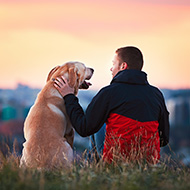Study reveals insights into “parenting” style on dog behaviour

The team found that dogs with authoritative owners were most likely to have secure attachment styles.
US researchers studying the impact of “pet parenting” styles on dogs have revealed specific cognition and behavioural patterns comparable to human parents and their children.
It is understood that parenting behaviour is an important factor in child development, including a child's mental health, social cognition, intellectual success and job performance.
In the paper published in the journal Animal Cognition, researchers examine, for the first time, how the quality of a human-canine relationship may influence a dog's performance on behavioral and cognitive tests.
A total of 48 dog owners participated in the study, and each completed a 'pet parenting' style survey. From their answers, the owners were split into three categories, comparable to those used in human parenting research: authoritative (high expectations, high responsiveness), authoritarian (high expectations, low responsiveness) and permissive (low expectations, low responsiveness.)
Next, the dogs participated in three behavioural tests evaluating attachment to their owner, sociability when a stranger is present, and ability to complete a puzzle game with different levels of help from their owner.
The team found that dogs with authoritative owners were most likely to have secure attachment styles, were highly responsive to social cues, and showed a preference towards their owner compared to a stranger. They were also the only dogs in the study to successfully solve the puzzle task.
Compared to dogs in the authoritative group, dogs with authoritarian owners were more likely to have an insecure attachment to their primary caregiver. In the sociability test, these dogs spent more time attempting to get close to their owners than the strangers.
Finally, dogs with permissive owners followed the social cues of a stranger but not their owner. These dogs spent a similar time with their owner, regardless of whether the owner was attentive, and were less persistant at solving a puzzle task.
Study author Monique Udell, an associate professor at Oregon State and an expert on dog behavior, said: “We found that pet parenting style does predict patterns of dog behavior and cognition. This an important finding because it suggests that dog owners who take the time to understand and meet their dog’s needs are more likely to end up with secure, resilient dogs.”
Study co-author Lauren Brubaker added: “This research shows that the pet dog-human caretaker bond may be functionally and emotionally similar to the bond between a human parent and their child.”



 The RCVS has announced a new version of its 1CPD mobile app, with enhanced features for veterinary surgeons and veterinary nurses to record their continuing professional development.
The RCVS has announced a new version of its 1CPD mobile app, with enhanced features for veterinary surgeons and veterinary nurses to record their continuing professional development.